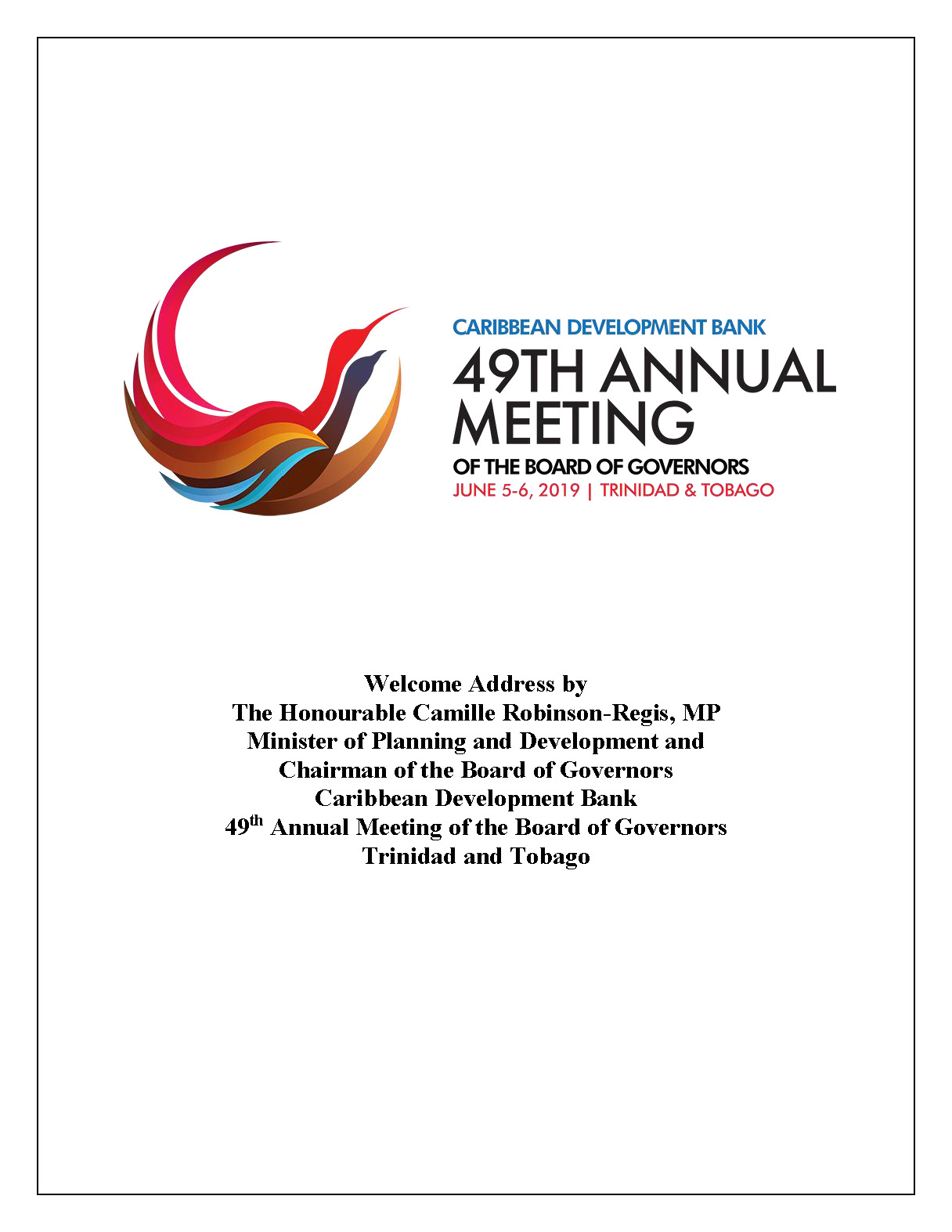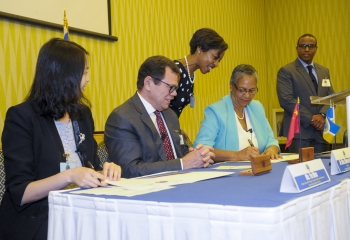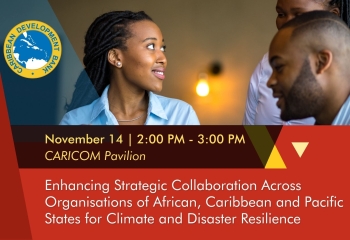
Introduction
On behalf of the Government and People of the Republic of Trinidad and Tobago, I wish to extend a warm welcome to all delegates. It is indeed both an honour and a privilege for Trinidad and Tobago to host the 49th Annual Meeting of the Board of Governors of the Caribbean Development Bank (CDB) and for me to serve as chair for this Meeting.
The Call for Transformation
The Annual Board of Governors Meeting is a very important event for our region. The high level policy discussions that are expected to take place over the ensuing days, and the decisions emanating therefrom, will undoubtedly serve to strengthen even further, our efforts and aspirations towards sustainable development. This year’s theme - Transformation – is especially pertinent to the region as this meeting presents an opportunity for the exchange of ideas, approaches and innovation, and the opportunity for us to learn from each other, while we place the Region’s development at the forefront.
This year’s theme represents an extension of last year’s, as the region seeks to progress from a period of Resilience-Building to one where our efforts now include the pursuit of a comprehensive set of transformational strategies that will allow us to firmly tackle the modern and complex challenges that present themselves, whilst simultaneously stimulating growth and development in the region.
There can be no doubt that the multifaceted challenges currently facing us as small island developing states, require a bold, risk taking, no-nonsense approach. It requires the adoption of new and innovative policies, programmes, utilization of new ways of financing, and the nurturing of existing partnerships, even as we seek out new ones.
The region, however, should not be defined by these challenges. Rather, it is the manner in which we respond to and overcome them that will further define who we are. We have a storied history and share a rich cultural heritage and identity of which we can all be proud. My questions to you are these: how do we rise above these emergent challenges? In a world where political and economic blocs are seemingly being broken, and tariff wars are escalating amongst our major trading partners, how do we re-position ourselves as a region so that our collective voice is heard in the international market space? How do we transform into the resilient, productive, innovative countries, prepared to face the next few decades when, in a very real sense, the jobs which will be required are not yet even named?
Colleagues, this call for transformation is not just a fancy buzzword attached to this Meeting. In fact, it truly represents our endeavour to follow through and remain committed to continuously evolving and improving in our efforts to develop solutions and strategies to drive economic and social transformation in the Caribbean.
Fundamental to this kind of development and change, is the need for transformative interventions to address the challenges that we currently face. Internationally, the imminent threat of human-driven climate change and pollution presents developmental challenges.
We have also seen instability as the geopolitical landscape seems to be in a state of flux, with the issue of mass migration continuing to put a strain on countries’ resources. While intra-regional migration is neither new nor undesirable, the issue of mass migration as a result of political instability in neighbouring countries has the potential to impact deleteriously on small economies. Collaboration, cooperation and consensus as a region, to develop the right set of policies, is therefore pivotal to managing these dynamics.
The digital environment continues to change the way we live, work and communicate, as more of our traditional jobs are becoming obsolete and the flow of work to which we have grown accustomed is disrupted. With disruption threatening to become the new normal, we cannot ignore its potential to accelerate innovation and improve productivity in key sectors.
The speed at which this Fourth Industrial Revolution is unfolding must, of necessity, force those of us who occupy the seats of governance to both rethink our countries growth strategies and how existing organisations, like the CDB, can create added value to its members. It has to be about more than just technology-driven change; it is an opportunity to help everyone, including leaders, policy-makers and people to leverage converging technologies. What this means for us as a region is that complacency has become unaffordable and business as usual extremely expensive. The real opportunity here lies in our ability to use this advancement to positively impact and improve the lives of those we have been called to serve.
The region’s private sector is one of the key partners that must be encouraged to have greater involvement in our development agenda as they have a critical role to play as a driver of growth and development. It is often said that firms compete but nations don’t. In this regard, it is our duty, as Regional policymakers, to lay the foundation and create a business friendly environment which attracts investment, enabling the private sector to innovate and thrive so that we can harness the true potential of our creativity.
What this mean is that there is need to strengthen our institutional capacities at the domestic and regional levels to improve the way we do business and facilitate the type of private sector led growth that we desire. We can also further partner through Public-Private Partnerships (PPPs) which present a real opportunity for fiscal sustainability and allows for closer ties and collaboration with the private sector in the provision of goods and services, and through the implementation of projects to address the developmental gaps that, from a governmental perspective, we may not be able to fill currently.
The Relevance of the Caribbean Development Bank
Having said this and in the midst of all of our challenges and opportunities, we acknowledge that the CDB stands out as a regional institution which is well- positioned to foster the kind of collaboration that is required to achieve the development agendas of its Borrowing Member Countries. Indeed, the Bank, has first-hand knowledge of the challenges faced in and by the region. It is this very Bank, which has repeatedly come to the rescue of its members in times of crisis. The extreme weather events that occurred in the region in 2017 and 2018 are stark reminders of this.
Trinidad and Tobago was not spared the brunt of this and I wish to offer my sincerest gratitude to the President and staff of the Bank for being one of the first financial institutions to offer assistance to our Government in the face of our adversity.
In this rapidly changing world, I wish to challenge the Bank to also adapt to this shifting landscape by transforming itself, not only to meet the current needs of its Borrowing Member Countries but by being even more proactive and innovative with its targeted interventions. As we experience the rise of new technologies, and disruptions in the traditional ways of working and manufacturing, we are simultaneously faced with challenges arising from mass migration and climate change, among others. These changing dynamics require novel methods that develop targeted interventions to treat with these modern issues.
I firmly believe that the Bank is well positioned to bridge the gap between our varying cultures and ideologies, especially in light of the increasingly insular world of which we are a part. With mounting international trade tensions, it is now more crucial than ever that the Bank reinforces the kind of collaboration needed to meaningfully deal with the contemporary challenges to which we are subjected.
Additionally, the CDB continues to play a vital role in easing the bottlenecks that we as policymakers continue to experience, in implementing policies and programmes, and advancing not only socio-economic development but also the environmental sustainability to which we aspire.
I wish to commend the President of the Bank, the Management Team and the CDB Board of Directors on the work undertaken over the last year. The CDB has provided tremendous support to its BMCs for much needed reform and action geared towards building macroeconomic resilience, environmental sustainability, productivity and competitiveness. I would like to highlight some recent developments within the Bank:
- An agreement with the United Kingdom’s Department for International Development which added £30 million to the United Kingdom Caribbean Infrastructure Fund for reconstruction in Barbuda and Dominica;
- The Dominica Disaster Recover and Resilience Fund established and funded by the Government of Canada, which will enhance post-disaster response, build more climate resilient schools, and empower communities across the country; and
- The signing of an agreement with the Green Climate Fund which will facilitate more the financing of more climate-related projects in the Region.
We look forward to the many benefits and opportunities that these initiatives will bring to the region.
As the Bank prepares to celebrate its fiftieth anniversary, we must recognise the significant efforts made in its internal reform agenda, all designed to enhance institutional efficiency, effectiveness and relevance. We note that information technology is now driving the Bank’s internal transformation efforts geared towards re-shaping processes and to ensuring the Bank’s ability to deliver a more efficient and higher quality service. The Bank must be commended for constantly seeking to review and refashion these aspects of its operations leading the way in managing disruptions.
I wish to thank the staff at the Bank for continued support to Trinidad to Tobago. We are grateful for the assistance received over the past year and certainly look forward to the CDB playing a more prominent role in our country’s developmental thrust.
Conclusion
Ladies and Gentlemen, I pray that our deliberations over the next few days are fruitful and the exchanges undertaken are done with a view of placing the region’s development agenda at the forefront.
I certainly hope that the arrangements that have been put in place for the hosting of this Meeting will meet with your expectations, as our intention is to create an atmosphere that is both comfortable and conducive to productivity.
As Chairman of this 49th Annual Meeting of the Board of Governors of the Caribbean Development Bank and on behalf of the Government of Trinidad and Tobago, I hereby declare this meeting officially opened and once again welcome each and every one of you to this beautiful twin island Republic of Trinidad and Tobago.


